Assessing Coffee Consumption Effects on Pet Birds
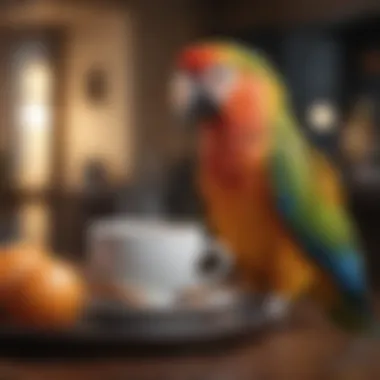
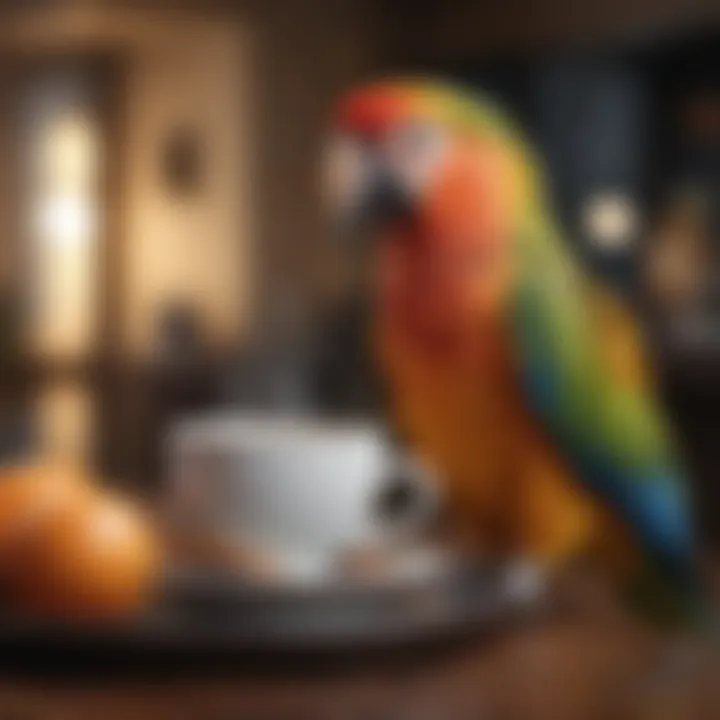
Intro
The topic of coffee consumption often sparks curiosity, especially among pet bird owners. The complexities surrounding the ingestion of coffee by avian species require thorough examination. Birds, as a unique group of pets, present distinct dietary needs and challenges. Understanding how caffeinated beverages like coffee affect these animals is crucial for their health and longevity. With the growing trend of pet owners offering a wider variety of treats, it is essential to assess the impact of coffee on birds and establish safe guidelines.
Care Tips
Proper care of pet birds extends beyond regular feeding and cage maintenance. It encompasses a thoughtful consideration of their overall diet, which can include occasional treats. However, as we delve into the topic of coffee, it is vital to understand the existing care practices that support a healthy lifestyle for birds.
Daily Care Routines
Daily routines should emphasize wing and beak checking, fresh water supply, and a balanced diet. Changes in behavior or physical signs can help owners identify any issues promptly. Additionally, regular exposure to a variety of seeds, fruits, and vegetables is recommended.
Cage Setup and Maintenance
A bird's cage should be spacious and stimulating. It must include perches at various heights, toys, and plenty of ventilation. Maintenance involves routine cleaning to prevent the buildup of harmful bacteria.
Hygiene and Cleaning Practices
Keeping the cage clean is non-negotiable. Owners should wipe down perches, food bowls, and toys frequently. A deep clean involving a water and vinegar solution can be effective. Staying on top of hygiene practices ensures a healthy environment.
Seasonal Care Adjustments
Season changes can affect bird health as well. In winter, additional warmth might be needed, while during summer, keeping the environment cool is essential. Also, adjusting diet to include fresh produce that is in season can enhance overall bird health.
Behavioral Insights
Understanding behavior is crucial in maintaining the well-being of pet birds. Each species may display unique signs, and recognizing these can lead to a healthier relationship.
Understanding Bird Body Language
Birds communicate through body language. For instance, ruffled feathers may indicate stress, while a relaxed stance suggests comfort. Observing these subtle cues allows owners to respond appropriately.
Common Behavioral Issues and Solutions
Common issues such as feather plucking or aggression can arise due to stress. Identifying their triggers is the first step to implementing solutions, such as ensuring they have enough mental stimulation and social interaction.
Positive Reinforcement Techniques
Using positive reinforcement is effective in training. Rewarding your bird with a preferred treat — preferably healthy options — for desired behaviors encourages more of the same.
Social Interaction Needs
Birds are social creatures. Regular interaction with their owners, or even another bird, caters to their social needs, leading to a happier and healthier pet.
Nutrition Guides
Nutrition stands as a fundamental pillar in bird care. Understanding which foods are safe and beneficial is paramount for maintaining health.
Essential Diet Components
A well-balanced diet for pet birds includes seeds, grains, fresh fruits, and leafy vegetables. Avoiding excessive high-fat seeds is vital for preventing health issues.
Safe and Toxic Foods
Many foods can be harmful to birds. Onions, chocolate, and avocado are toxic. Owners must research safe foods to ensure their bird’s well-being.
Supplements and Treats
Supplements can serve as beneficial additions. Calcium and vitamin supplements help enhance the diet. Organic alternatives of treats, such as dried fruit, forged bird health over time.
Feeding Strategies for Different Species
Not all birds have the same dietary needs. Larger birds may require more substantial fruits, whereas smaller birds might thrive on softer seeds and vegetables. Owners must tailor feeding strategies accordingly.
Wellness and Health
Regular health monitoring helps catch problems early. This involves observing for behavioral changes or physical symptoms. A proactive approach leads to successful bird care.
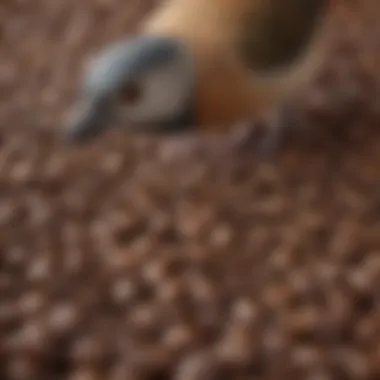
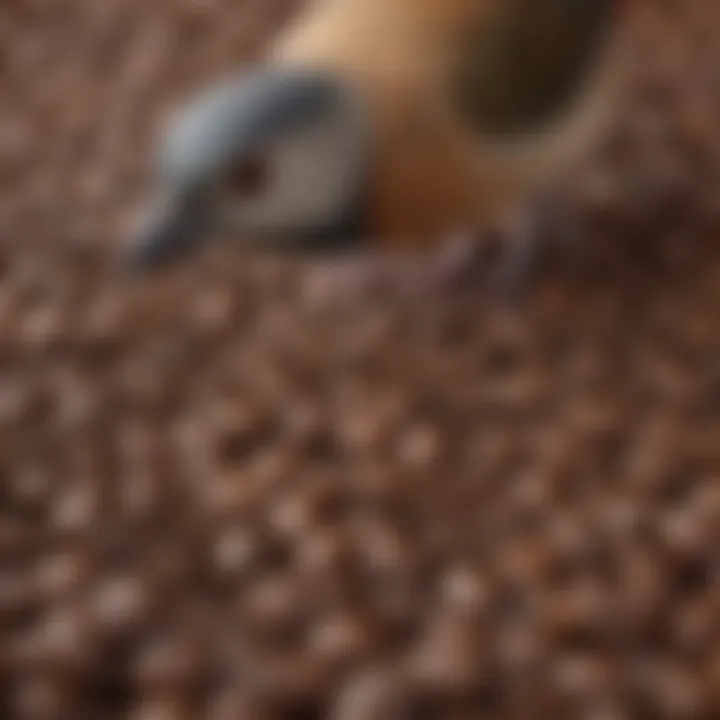
Routine Health Checkups
Routine checkups with an avian veterinarian are recommended. These appointments should include thorough health assessments and vaccinations as necessary.
Identifying Symptoms of Illness
Recognizing the signs of illness, such as lethargy, changes in appetite, or abnormal droppings, is essential. Early detection can be crucial.
Preventative Care and Vaccinations
Preventative care includes ensuring birds are vaccinated against common diseases and have regular parasite checks. Consult with an avian vet for personalized care plans.
Mental and Emotional Well-being
Mental health matters for birds. Providing engaging environments, toys, and social interaction supports emotional well-being. A bird that feels safe and stimulated is less likely to develop behavioral issues.
Enriching Activities
Engagement is key to a happy pet. Enrichment activities can help achieve this goal.
Toys and Playtime Ideas
Offering a variety of toys ensures mental stimulation. This can include chew toys, foraging toys, and interactive toys designed specifically for birds.
Training and Tricks
Training exercises can improve relationships between birds and their owners. Simple commands and tricks provide mental stimulation and bonding opportunities.
Outdoor Activities and Interaction
Taking birds outdoors safely can offer fresh air and a change of scenery. It’s essential to ensure safety, including using harnesses or secured enclosures.
DIY Projects for Mental Stimulation
Bird owners can create their own toys and foraging opportunities using safe materials. This cost-effective method allows for customization based on the bird's preferences.
Prelude
The exploration of coffee consumption among pet birds brings forth significant conversations about diet and health in avian species. With an increasing number of pet owners, it is essential to understand the implications of introducing non-traditional items, like coffee, into a bird's diet. This article delves into the nuances associated with caffeine and its effects, offering insight into what pet owners should consider.
Understanding these factors benefits bird owners by informing them about safe dietary choices. An awareness of avian dietary requirements forms the foundation for any decisions regarding treats and overall nutrition. In an age where the well-being of pets is paramount, discerning the consequences of giving such treats as coffee is essential. This knowledge not only promotes a healthier life for pet birds but also cultivates a strong bond between the owner and their avian companions.
By scrutinizing the physiology of birds in relation to caffeine, we prepare pet owners to make informed decisions. This is not merely about restricting certain foods; it’s about fostering a healthy relationship with what we offer our feathered friends. An informed approach to their diet ultimately shapes their overall health and behavior.
Understanding Avian Dietary Requirements
Pet birds have specific dietary needs that differ significantly from humans and even other pets. A balanced diet plays a crucial role in their physical health and mental well-being. Birds usually require a mixture of seeds, pellets, fruits and veggies, supplemented by the right vitamins and minerals. Many bird owners make the mistake of solely feeding seeds, which can lead to nutritional deficiencies.
A comprehensive understanding of what birds require allows owners to offer a varied intake, supporting not only their health but also their natural behaviors. For instance, many species thrive on a diet rich in fresh fruits and vegetables, which provide essential hydration and nutrients. Some key components include:
- Seeds and Pellets: The primary food source should be high-quality pellets to ensure they receive all necessary nutrients.
- Fresh Fruits and Vegetables: Items like apples, carrots, and leafy greens are invaluable for a well-rounded diet.
- Proteins: Some birds benefit from occasional protein sources like cooked eggs or legumes.
Understanding these components is the first step in ensuring that birds do not just survive but thrive.
Caffeine: A Brief Overview
Caffeine is a stimulant commonly found in various beverages, notably coffee, tea, and sodas. In moderate amounts, it can have noticeable effects on humans, ranging from increased alertness to enhanced mood. However, caffeine’s impact on birds is less understood. Birds metabolize substances differently than mammals, making caffeine particularly concerning.
Research shows that caffeine can induce a range of physiological reactions in birds. Even small amounts can cause increased heart rate, agitation, or even toxicity, depending on the species and quantity ingested. It is crucial to note that many birds are far more sensitive to caffeine compared to humans. This sensitivity heightens the risks of incorporating coffee into their diet.
As pet owners consider such health-related matters, awareness of caffeine's effects is essential. Understanding these complexities can drive better dietary practices for pet birds, ensuring they maintain optimal health.
Bird Nutrition Fundamentals
Understanding bird nutrition is crucial for pet owners who aim to provide a balanced and healthy diet for their feathered companions. Birds have unique dietary requirements that significantly differ from those of mammals. It is not only about what birds eat but also understanding how various foods impact their overall health. A proper diet can enhance birds’ vitality, promote beautiful plumage, and even influence mood and behavior.
In this section, we will cover essential nutrients required by pet birds and common dietary pitfalls that owners may encounter. This knowledge serves as a foundation for making informed dietary choices, particularly when considering treats like coffee.
Essential Nutrients for Pet Birds


Pet birds need various nutrients to thrive. The most important include:
- Proteins: These are vital for muscle development and overall health. Foods rich in protein are seeds, nuts, and legumes.
- Vitamins: Essential for metabolism and immune function. A varied diet including fruits and vegetables can provide necessary vitamins such as A, C, and E.
- Minerals: Calcium and phosphorus are crucial for strong bones and egg production in breeding birds. Green leafy vegetables and mineral blocks can help fulfill these needs.
- Fats: Healthy fats provide energy. Seeds like sunflower seeds contain beneficial fats, though moderation is key to prevent obesity.
Having an understanding of these nutrients leads to better dietary choices, support for general well-being, and a lower risk of nutritional deficiencies.
Common Dietary Mistakes
Bird owners often make several dietary errors that may harm their pets' health. Some frequent mistakes include:
- Over-reliance on seeds: Many owners believe seeds are adequate. However, a seed-only diet lacks essential nutrients. A balanced approach should include fruits and vegetables.
- Neglecting fresh foods: Fresh fruits and vegetables are critical for providing vitamins and hydration. Avoid them, and birds may suffer from malnutrition.
- Offering processed foods: Treats high in sugar or salt can lead to serious health issues. Owners should prioritize natural options over processed treats.
- Forgetting about water: Clean, fresh water is crucial. Birds need to drink regularly, and lack of water can lead to dehydration.
"A varied diet is key to a pet bird's health. Ignoring this principle can lead to severe consequences."
By recognizing these common pitfalls, pet owners can take proactive steps to ensure their birds receive a nourishing diet. Ultimately, understanding these fundamentals lays the groundwork for when considering any other food items, including coffee.
Caffeine and Its Effects on Birds
Understanding the impact of caffeine on birds is critical for pet owners and breeders. Caffeine is a central nervous system stimulant commonly found in coffee, tea, and various energy drinks. While humans may enjoy the boost of energy from caffeine, birds have different physiological responses. Knowing these differences is important for making informed feeding choices.
This section explores two main elements: the physiological responses birds exhibit when exposed to caffeine and the potential toxicity thresholds specific to avian species. Understanding these factors ensures bird owners can better maintain the health and well-being of their pets.
Physiological Responses to Caffeine
When birds consume caffeine, their bodies respond uniquely. Birds, like many other animals, metabolize caffeine differently than humans do. The stimulant can affect various bodily functions such as heart rate, blood pressure, and general behavior. These physiological changes are critical to observe as they indicate how caffeine can impact a bird's health.
Birds generally exhibit increased heart rates. For example, heart rates that are already rapid can become dangerously high after caffeine ingestion. This is not just an isolated concern; it may lead to severe health issues, including arrhythmias or other heart-related conditions.
Behavior-wise, effects may include restlessness, increased vocalization, or even hyperactivity. Some birds might seem more alert or energetic, but this behavioral change can be misleading. Owners should remain cautious, as the apparent increase in activity could mask underlying health problems. Prolonged exposure to caffeine may lead to stress on organs, particularly the heart and liver, which can have long-lasting impacts.
Toxicity Thresholds in Avian Species
Different bird species have different tolerance levels for caffeine, making it hard to establish universal safety guidelines. Some species may display symptoms of toxicity with minimal exposure, while others may tolerate slightly higher amounts.
Research has shown that small birds tend to experience adverse effects more readily than larger birds. For instance, finches and canaries are more susceptible to caffeine toxicity compared to cockatiels or larger parrots. The lethal dose of caffeine is estimated to vary between species, but signs of toxicity can begin to appear with as little as 10-20 mg of caffeine per kilogram of body weight in smaller birds.
Symptoms of caffeine toxicity may include:
- Increased heart rate
- Restlessness
- Tremors
- Vomiting
- Diarrhea
- Seizures
Careful consideration of all the variables is crucial. Pet bird owners must be informed about these risks and their consequences. It is essential to consult with a veterinarian immediately if a bird has ingested coffee or any caffeine-containing product.
Can Birds Digest Coffee?
Understanding whether birds can digest coffee is crucial for any bird owner. This exploration helps in assessing not only the safety of introducing coffee into a bird's diet, but also the broader implications of caffeine consumption. Creatures with intricate metabolic systems, birds react differently to substances that may seem harmless to humans. The following sections detail how birds might ingest coffee, followed by an examination of their potential reactions to this beverage.
Method of Ingestion
The way birds might come into contact with coffee is significant. Generally, coffee consumption by birds can occur in two main scenarios: direct ingestion or as an additive to their food. Direct ingestion can happen if a bird is attracted to the scent of coffee, particularly more aromatic blends like espresso. They might peck at the discarded grounds or sip spilled liquid.
Alternatively, coffee could be offered intentionally by well-meaning owners who wish to treat their feathered friends. This practice, however, raises questions regarding health and nutrition. Unlike humans, many pet birds have delicate digestive systems that are not equipped to handle foreign substances efficiently.
Birds primarily consume seeds, fruits, and vegetables. Therefore, coffee does not form a part of their natural diet. When considering method of ingestion, keep in mind the possible risks involved:
- Sipping from coffee cups: Birds may find their way to cups left unattended.
- Food additives: Adding coffee to birdseed or homemade treats could alter their nutritional balance.
Both scenarios highlight the need for caution. Bird owners should be conscious of what their pets consume, ensuring that any inadvertent meeting with coffee is promptly addressed.
Potential Reactions to Coffee
Birds may exhibit a range of reactions to coffee, having implications for their health and behavior. Caffeine, the main active compound in coffee, can contribute to both physiological and psychological changes. Here are some potential effects:
- Increased Heart Rate: Caffeine can lead to heightened heart rates in birds. This response can place stress on their cardiovascular system, leading to potential health issues.
- Anxiety and Stress: Signs of anxiety can manifest when caffeine is consumed. Birds might become more agitated, vocal, or restless.
- Digestive Disturbances: The digestive tract of birds has specific enzymatic requirements. Coffee could irritate their gastrointestinal system, leading to symptoms like vomiting or diarrhea.
- Addictive Behaviors: Like in humans, caffeine can lead to mild dependency. Birds exposed repeatedly may seek it out more aggressively than other foods.
"Birds are not biologically suited for caffeine consumption, making it dangerous to incorporate coffee into their diets."
Common Myths and Misconceptions
In the context of pet birds and their dietary needs, understanding common myths surrounding coffee consumption is essential. Misinformation can lead to unintentional harm or neglect in providing appropriate care. By debunking these myths, bird owners can make informed decisions about the dietary habits of their feathered companions. The importance of this topic lies not only in safeguarding bird health but also in fostering a greater understanding of their nutritional requirements.
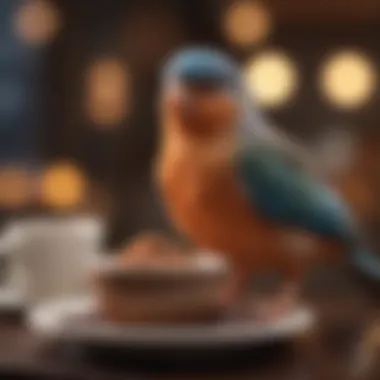
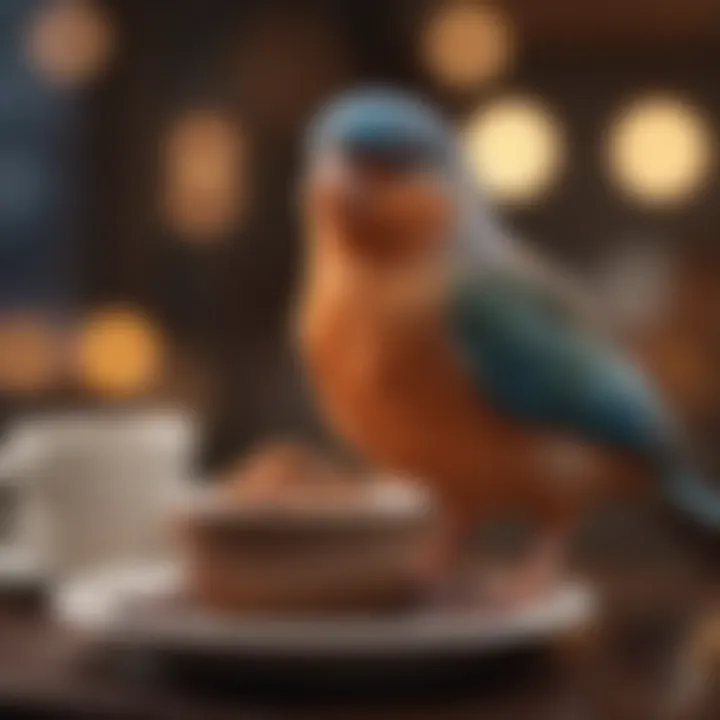
Caffeine and Hyperactivity
Many people believe that caffeine will cause hyperactivity in birds, similar to its effects in humans. This assumption stems from observing how caffeine can stimulate human behavior. However, this view oversimplifies the biological responses of avian species to caffeine intake.
Studies indicate that while caffeine can influence neurological activity in birds, its effects vary greatly among individual species. Some birds may indeed become restless after consuming caffeine, but others may not exhibit any noticeable changes in behavior.
- Potential Hyperactivity Effects:
- Species Variability: Can vary based on individual bird species. Some experiences hyperactivity, others may not.
- Caffeine Dose: The amount of caffeine ingested plays a critical role. Small doses may not cause any significant changes.
- Individual Sensitivity: Just like humans, some birds may be more sensitive to caffeine than others.
This suggests that pet owners should be cautious rather than outright forbidding coffee. Assessing each bird's response is key to providing a balanced approach to treats and snacks.
Coffee as a Social Treat
Bird owners often view coffee as a social beverage and may consider sharing this experience with their pet birds. It is common to see people sipping their morning coffee while engaging with their avian companions. This raises the question of whether coffee can serve as a social treat for pet birds.
The notion that coffee promotes social bonding is appealing but requires a more nuanced understanding.
- Considerations for Offering Coffee as a Treat:
- Toxicity Risks: Coffee contains compounds that may pose health risks to birds.
- Alternative Social Snacks: Bird-safe treats exist that can fulfill the same social function without involving caffeine. For instance, small pieces of fruit can be shared.
- Health Impact: Frequent exposure to coffee may lead to detrimental health effects.
In summary, while including coffee in social interactions may be tempting, the potential risks are generally not worth it. Now it is smarter to find fun and healthy alternatives that can enhance the social bond without compromising health.
"Understanding the myth and realities of coffee consumption in birds is not only critical for their health but also fosters informed decisions among bird owners."
By addressing these beliefs, the article intends to bring clarity to a subject often clouded by misinterpretation and highlight healthier avenues for interaction.
Recommendations for Bird Owners
Understanding how coffee consumption affects pet birds is critical for bird owners. It is essential to recognize the potential risks associated with introducing caffeinated drinks into an avian diet. This section seeks to equip bird owners with knowledge that can help them make informed decisions about their pets' health.
The complexities of avian physiology mean that even small amounts of caffeine can trigger adverse effects. Thus, owners must prioritize safe dietary choices for their feathered companions. Every bird is unique, and their nutritional needs vary based on species, age, and health status. Therefore, awareness and attention are paramount.
Key recommendations include:
- Avoiding any form of caffeine, including coffee, tea, and soda in birds' diets.
- Providing alternatives that offer hydration and enjoyment without harmful effects.
- Discussing dietary choices with a veterinarian, particularly if any changes are made.
These considerations can enhance the overall health and well-being of birds. By adhering to these recommendations, bird owners can prevent potential health problems arising from inappropriate dietary habits.
Safer Alternatives to Coffee
Bird owners often wonder what safe alternatives exist to replace coffee. While birds do appreciate variety, it’s vital to offer treats that enhance health rather than compromise it.
- Herbal Teas: Non-caffeinated herbal teas can serve as a flavorful drink. Infusions like chamomile or peppermint often can be diluted and offered to birds in moderation.
- Fruit Juices: Freshly squeezed fruit juices, such as apple or orange, can be enjoyed by pet birds. However, these should be offered sparingly due to natural sugars.
- Filtered Water: The safest and most essential choice remains clean, filtered water. It is critical for hydration and supports overall avian health.
- Vegetable Broths: Homemade, low-sodium vegetable broths are a nutritious option that many birds may enjoy.
- Specialty Bird Treats: There are numerous bird-specific treats available that are safe and enjoyable. Owners should choose those made without sugars or artificial additives.
Monitoring Bird Behavior Post-Ingestion
Detecting changes in behavior is crucial. After any potential exposure to coffee or other new foods, owners should monitor their birds closely. Distinct behavioral patterns or physical changes may indicate discomfort or distress.
- Obsering Hydration Levels: Ensure birds maintain hydration. If birds appear lethargic or disinterested in their usual behavior, they may need careful observation.
- Watch for Hyperactivity: Interestingly, caffeine can lead to hyperactivity in some animals. An increase in restlessness or agitation following ingestion is a warning sign of potential issues.
- Check for Gastrointestinal Symptoms: Any signs of vomiting, diarrhea, or changes in appetite should prompt immediate action. These can indicate adverse reactions.
- Professional Consultation: In case of distress, reaching out to an avian veterinarian promptly is advisable. They can provide tailored advice and treatment based on the observed symptoms.
Monitoring your bird after any dietary change is essential to ensure their health and happiness.
By implementing these recommendations, bird owners can navigate the complexities of avian nutrition while ensuring their pets thrive. The responsibility towards our feathered companions necessitates vigilance, care, and a deep understanding of their needs.
Ending
The conclusion section of this article highlights the key points regarding the impact of coffee consumption on pet birds. This comprehensive overview emphasizes the necessity for bird owners to be informed about what is safe and healthy for their avian companions. Given the physiological vulnerabilities of birds, the ingestion of coffee and its primary component, caffeine, presents serious considerations that cannot be overlooked.
Summary of Findings
In evaluating the research surrounding caffeine and its effects on various avian species, a few significant findings emerge:
- Physiological Effects: Caffeine can impact a bird's heart rate and metabolism, leading to potential stress or other health issues.
- Toxicity Levels: Different bird species exhibit varying tolerance levels for caffeine; thus, something harmless to one type of bird could be dangerous to another.
- Digestive Challenges: Birds have distinct digestive systems that may not handle coffee well, leading to adverse reactions.
Understanding these points helps to frame conversations about dietary choices for pet birds. Bird owners are tasked with managing dietary options proactively and avoiding trends that could jeopardize their birds’ health.
Final Thoughts on Avian Diet
Ultimately, the choices made regarding a pet bird's diet have extensive ramifications on its health and well-being. While coffee might appear to be a benign treat for bird owners based on their habits and preferences, it is crucial to remember that pet birds thrive on specific diets formulated for their unique dietary needs. Avian owners should continue to educate themselves about safe alternatives that provide nourishment without risking the health of their birds.
"Birds require specialized dietary practices that differ significantly from those of humans, stressing the importance of informed choices among pet owners."
In summary, it is vital for pet bird owners to prioritize avian health by remaining vigilant about what they offer. Understanding the implications of coffee on avian physiology aids in making informed dietary decisions, ultimately promoting the health and longevity of these cherished companions.















